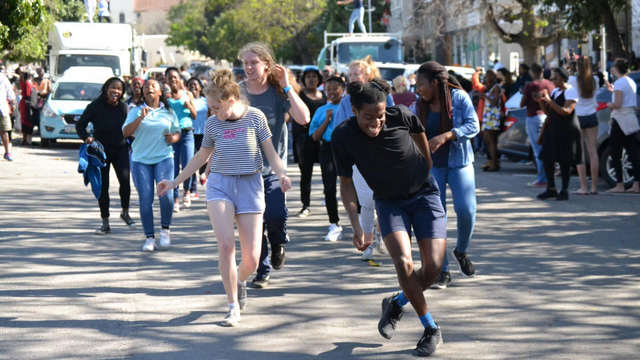
In the course of 2019, the Rhodes University Drama Department staged several theatre-based performances as vehicles for social intervention and change. Topics varied from addressing local government corruption, to tackling alcohol and drug abuse on campus, to increasing public awareness about the ongoing drought in the Eastern Cape, to the plight of gender-variant students on campus. These interactive performances provoked audiences and advocated social and behavioural change.
- The department’s social programme started with its annual Orientation Show, commissioned by the Division of Student Affairs. This production introduced Drama 1 students to challenges that first year students typically face, exploring and offering strategies on matters such as withstanding peer pressure, dealing with cultural and language diversity, and understanding what “consent” means in relationships. The production was followed by a session in which “playback theatre” was used as a means to invoke discussion. In this form of theatre, the audience has an opportunity to contribute stories which are then “played back” to them by the actors.
- Shortly after the Orientation Show, the Drama Department, in conjunction with the School of Journalism, conducted a “theatre for social justice intervention” called “Ukunuka Forum Theatre”. The project was sponsored by the Open Society Foundation, which aims to “build vibrant and inclusive democracies whose governments are accountable to their citizens”. The play, Kunuka Phi, was staged in community halls, schools, town squares and open spaces across the Makana Municipality during March and April. This participatory performance with community artists was inspired by local journalist’s stories about “ghost” municipal workers and undrinkable water. The play was a dialogue that gave the audience the opportunity to reflect upon, question and laugh about the situations portrayed and also to create desired solutions. The project used a multi-disciplinary research approach involving artists, journalists and postgraduate students from the Department of Political and International Studies, generating knowledge about innovative and effective ways of addressing corruption.
- In the second part of the year, Drama students and various local organisations (including the Via Kasi Movers, Victoria Girls’ High School, Amaphiko Township Dance Project, Skate Ubuntu, Gift of the Givers, Kuyasa Special School, the South African Police Service and Makana Municipality) brought High Street to a standstill with a “flash” mob to raise awareness of the drought and critical lack of water in the area. The spectacle was created by merging different art forms, from dramatic arts to dance, to praise singing. Following the event’s opening by Makhanda’s local praise poet/imbongi Dumisa Mpupha, a relay race took place in which the athletes passed on water bottles while the audience did a group freeze. The event ended with a dance spectacle that drew attention to the valuable initiatives by the Gift of the Givers and also served to unify the multiple stakeholders within the Makana Municipality.
- In September, the Drama department’s MEQOQO Collective, in collaboration with the Student Representative Council and Division of Student Affairs, initiated a dialogue about the use and abuse of alcohol and drugs on campus. It was called, Purple Thursday: The Things I Didn’t Learn in Life Orientation. A form of theatre called “invisible theatre” was used to enact scenarios in locations where people would not typically expect to see a theatrical event. Performers disguise the fact that it is a performance from those who observe, thus leading spectators to believe that what they are witnessing is a real event rather than a performance. MEQOQO also conducted other socially relevant performances throughout the year. One of these performances was based on notions of “home”, while another was centred around “Heritage Day”, in a celebration and questioning of heritage. The MEQOQO Collective’s aim is to stimulate important conversations using the lived experience of the audience. Through playback theatre the audience or performers tell stories from their lives and watch them enacted.
- Several social activist performances were also done by the Drama Department’s Honours Applied Theatre students on a range of topics including the impact of divorce on young people and prejudice towards lecturers with non-standard English accents. The production Our Spaces: Why Keep The Boxes used “legislative theatre” to highlight the plight of gender-variant students on campus, interrogating university policies relating to gender-neutral facilities. The Honours Applied students were also invited to facilitate an Ocean Hub gathering in Cape Town during which playback theatre techniques were used to facilitate debate between Ocean Hub stakeholders from different parts of the world. Lastly, the department’s second year Acting students performed Children’s Theatre pieces to primary school children from local schools. This was an initiative in collaboration with the Rhodes Community Engagement Centre and ASSITEJ South Africa, an organisation that is aimed at developing theatre for young audiences.
In all the events it was evident that theatre is a powerful medium for giving audiences a sense of belonging and helping people to grapple with notions of identity and social change. It is clear that theatre and performance are increasingly becoming valuable tools for facilitating social change.

